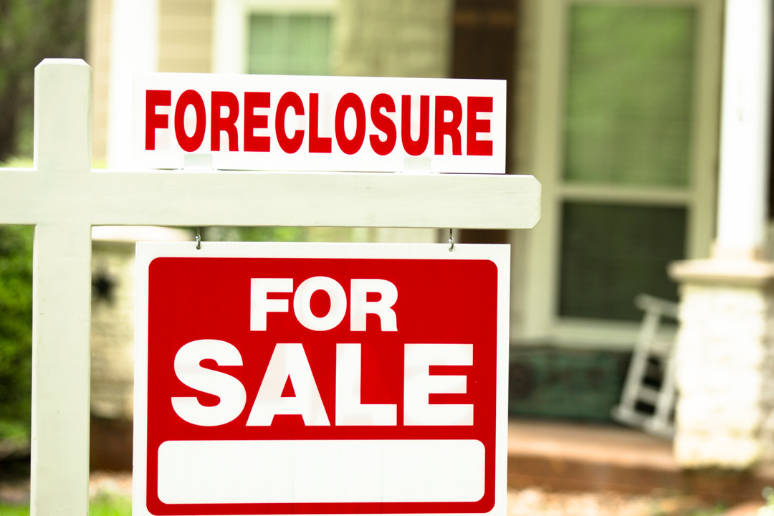During the mortgage foreclosure crisis, Chicago had the largest number of mortgage foreclosure. The New York Times reported in 2011, “The Chicago metropolitan area had 118,776 homes in May 2011 that were either owned by banks or were in the process of being taken over by lenders because the owners could no longer afford their monthly mortgage payments, according to RealtyTrac.”
While the foreclosure crisis has settled down over the past few years, foreclosures are still happening across the country. Getting a foreclosure notice can be scary and confusing so here’s some information for people to find the help they need.
What is a foreclosure?
A foreclosure is “when a buyer fails to make the payments due on the loan (defaults on the loan) the lender can foreclose, which means that the lender can force a sale of the home to pay for the outstanding loan.” While states have different laws around foreclosures, states have judicial foreclosures and others have non-judicial foreclosures. A non-judicial foreclosure means that “the lender can foreclose without going to court” while judicial foreclosure requires the lender to go through the court.
“A homeowner is generally considered to have defaulted in the payment of his or her mortgage when they are at least one payment late,” explains Elliot Schlissel at The Law Offices of Schlissel DeCorpo.
I missed a payment. What does that mean?
When you miss a payment or not pay the full amount of your mortgage, you may have some time to catch up. According to the Consumer Financial Protection Bureau (CFPB), “your mortgage servicer generally must:
- Try to contact you directly within the first 36 calendar days after you become delinquent.
- Send you a written notice with both a description of examples of loss mitigation options that may be available to help you avoid foreclosure and also application instructions or information about how to get more information about those options, if applicable. Your servicer has to send this no later than 45 calendar days after you become delinquent on your loan.”
The process can vary by state. Schlissel notes that in NY, “the financial institution must send the homeowner notice a minimum of 90 days before they file a summons and complaint in a foreclosure lawsuit.”
The Federal Trade Commission recommends reaching out to your loan servicer sooner than later if you are having difficulty with payments. Depending on certain criteria, you might be eligible for a loan modification from the Making Home Affordable Modification Program.
Matthew Hulstein, supervisor at Chancery Court Access to Justice Program and Foreclosure Mediation at the Chicago Volunteer Legal Services, advises getting trying to work the situation out with the bank, if possible, because once the foreclosure has been filed, “the mortgage has homeowner responsible for court fees,” which can be $2000/$3000 or more.
What are my options in foreclosure?
There are a couple of options depending on what your ultimate goals are. For people who want to potentially keep their home, there are a couple options:
Reinstatement: If you can make up all the past due payments as well as any late fees and court costs, the loan can potentially be reinstated with the bank, Hulstein points out.
Forbearance: This is where you and the bank have agreed that you will pay a smaller amount or no amount for a limited period of time until a temporary financial situation is resolved, explains Hulstein. However, the FTC advises, “forbearance isn’t going to help you if you’re in a home you can’t afford.”
Loan Modification: A loan modification “is a new contract with the bank that changes the terms of the loan,” Hulstein explains. You may work with a HUD-certified housing counseling agency on the application.
Whichever option you elect, Hulstein advises that people need to be active and involved in the process. They should keep a notebook to record names, times, dates, confirmation numbers and make sure to get records and follow up on applications. Homeowners may think they have worked something out with the bank, Hulstein says, but people shouldn’t “take anything for granted over the phone; agreements need to be in writing.”
Hulstein points out that an open forbearance or loan modification application under federal law automatically stops the foreclosure but won’t stop a foreclosure if the application is denied.
What if keeping the house isn’t financially viable?
If your financial position does permit you to keep the house or you have decided to walk away, homeowners have some options to leave the house.
Short sale: FTC explains, “your servicers may allow you to sell the home yourself before it forecloses on the property, agreeing to forgive any shortfall between the sale price and the mortgage balance.”
Deed in Lieu of Foreclosure: This is when the homeowner gives the property title to the loan servicer to cancel the debt, the FTC explains.
These options may help protect against the possibility of personal deficiency, where the homeowner is also personally responsible for the loan, even if they give up the house, Hulstein explains.
If I’m in foreclosure, am I immediately forced out of my house?
If you are in a state with judicial foreclosures, there’s time because the bank has to sue you. On average, it can take a year for the foreclosure to be final. However, if it’s a non-judicial foreclosure, the foreclosure may happen much sooner depending on the state.
In the case of a judicial foreclosure state, Hulstein advises people to stay in the home and not pay rent elsewhere while the process goes on. Once the foreclosure is finalized, states give people a set period to leave their home; in Illinois, it is 30 days but may be extended a little more due to extenuating circumstances.
When should I hire an attorney?
If you can afford an attorney, it will serve your ultimate goals, Hulstein explains. But he cautions that there are a lot of scams. If there is a legal issue raised, such as fraud or bank mistake, an attorney can be helpful to fight back against the loan servicer.
 By Elisa Shoenberger,
By Elisa Shoenberger, 

